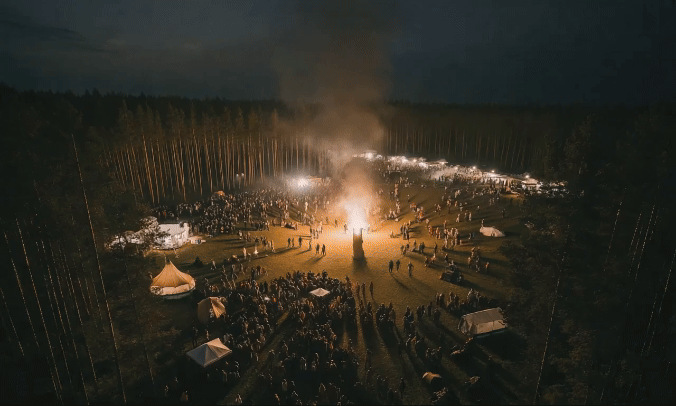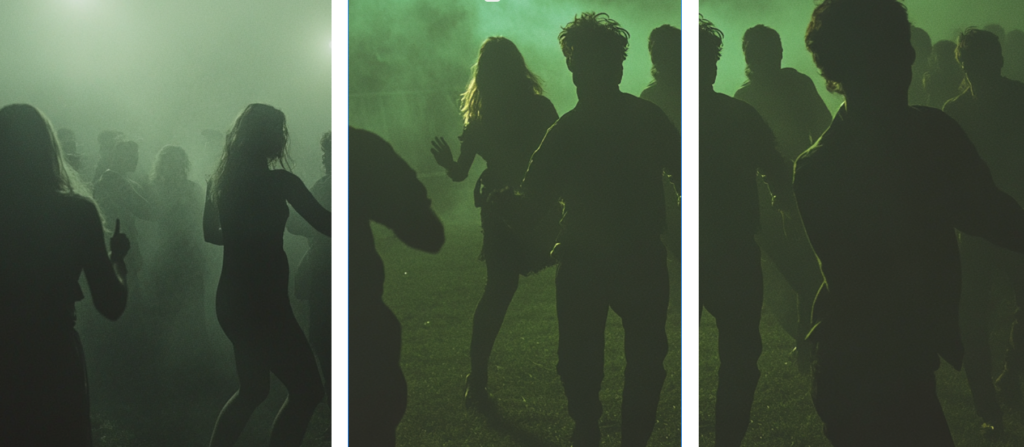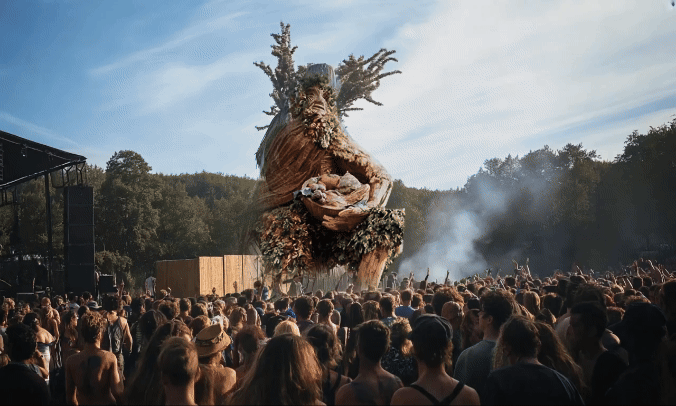Is the author’s agency – singular, shared, boundless or authorless?

ACT 1
[Music playing]
Lily: Hey you two, haven’t seen you before, let me show ya around!
The narrator: [At the annual Green Man festival lush forests surround the soft green clearing providing the perfect environment for such an event. A man of branch and leaf towers beautifully over the swaying crowd that has come from far and wide to enjoy the music and company. Dancing bodies fill the area as the opening act’s music echoes through the concert.]
[Start of lyrics]
The narrator: The air hums with the distant tunes of the AI Opener as Joseph and Fang are getting shown around by Lily. She’s a diehard fan of the festival, attending every single year.
Lily: Be careful of the wires, guys.
[Chords of orange and green snake under the feet of the festival goers and they (attempt to) avoid them with careful steps.]
Joseph: It’s a festival, it’s fine. They would’ve considered it already, relax. There’s no way they’d leave them out if they were important.
Fang: I mean hey, we’re only human, perfection isn’t exactly what we’re known for.
Lily: It’s connected to the main system, they had to get power here somehow so let’s just be mindful so we don’t mess something up for everyone here.
Joseph: If I designed it, I would’ve thought it through.
[song continues]
Fang: Do you guys know who wrote this song? I love it!
Joseph: I’m pretty sure it was just AI generated.
Lily: Just?
Joseph: AI is a tool, like a piano or hammer, that helps expand art reach into new technological spaces. My works are my own, not collaborations with the AI.
Lily: I mean, I think design belongs to everyone who shapes it, from concept to creation. It’s a shared authorship, a product of many hands and minds.
Fang: Yeah, who says we can’t coexist? The relation between the human and its computational image becomes that of the signified as the parent and the signifier as the descendant. We help it as much as it helps us.


[The question falls on empty ears as Joseph looks around mouth agape, not a thought in his brain at the moment.]
Joseph: Woah…how tall is that, they make it every year?
Lily: Ummmm, like 10 meters? They build a new one every year, yeah.
Fang: It looks…interesting. Who chooses the design?
Joseph: Couldn’t tell ya, but they definitely don’t have a degree, I wouldn’t stand within spitting distance of that thing.
Lily: Have a little bit of fun, my goodness, is he always like this?
Fang: Typically.
Joseph: I’ll grow on you.
[Music tempo increases]
String lights are strung between trees, illuminating the crowd. Music pulses through the air as people sway in rhythm, as if they were a single organism. The trio inches their way toward the stage, looking for the best spot to take in the show. Occasional glimpses of other festival-goers laughing, dancing, and clinking glasses add to the vibe and fill the gaps of silence between the music and quiet of the forest.
[Lily turns to Joe, nudging him playfully.]
Lily: Hey, Joe, you gonna dance or you’re too cool for that sorta thing?
Joseph: It’s a little hard to groove to something I know wasn’t written by a real life musician. Like who even gets the credit? ChatGPT as an author? Seriously?
[Ari raises an eyebrow, chuckling at Joe’s remark.]

Ari: Why are we talking about the author to begin with?
Fang: Uhhhhh, who the hell is this guy?
[It seems that a 4th has invited themselves into the play. Dressed to impress, Ari made their way over to the group as their discussion piqued his interest. Ignoring Fang’s comment, Ari steps forward, looking right at Joe with a hint of intrigue.]
Ari: The author is dead. It’s not about who created what at all. Writing is that neutral, composite, oblique space where our subject slips away, the negative where all identity is lost.
[Joe while slightly taken aback.]
Joseph: Pardon, do we know you?
Ari: Sorry about that, where are my manners? My name is Ari Lennox, I’m the bassist for one of the bands tonight. And you are…..?
Joseph: I’m Joe, this is Fang, and we just met Lily who’s showing us around.
Lily: [addressing Ari, her tone curious] Going back to what you said… Ari, right? Doesn’t the songwriter serve a purpose? They’re writing with an intent, there’s a point to the stories. Doesn’t that mean something?
Ari: Not for me. I write whenever I feel like it. Sing ‘em, record ‘em, and once they’re out there in the world I just…let ’em go. Ya know? It’s language that speaks, not the author; to write is to reach that point where only language acts, “performs”, and not me. (paraphrased quote) Every single person is going to have a different experience with my music, so why put a labeled meaning? [shrugging casually]
Fang: So does music have no meaning to you? I mean personally I think to create is to interact, to respond and adapt, just like in nature. It’s not a solo endeavor but a coalescence of forces. Music affects and changes people in so many ways.

[Joe nods in agreement.]
Joseph: True art has intention behind it- a hand that sketches, a mind that envisions. Without a person, it’s just shapes, not meaning. (paraphrased)
Ari: Yes, I’m not saying it doesn’t have impact or meaning, I’m just saying that I personally don’t define a meaning for the listener. To give text an author is to impose a limit on that text.
Joseph: So then what do you feel about this new wave of AI made “music”, I mean it’s gotta bother you, right??
[Song continues]
As the crowd gets denser and the energy begins to rise, the conversation feels more and more out of place. Not just to them but the surrounding people.
Festival Goer: What on earth are yall talking about, just enjoy the vibe! Have fun! Let loose!
[The group laughs, feeling the light-hearted nudge. As the crowd shifts, the festival-goer blends back in with the dancing masses, gone as quickly as they appeared.]
[Ari glances toward the stage, catching sight of his band members signaling him over.]
Ari: I’d love to continue this chat, but my group’s on next so I’ll see you guys in a bit! Enjoy!

ACT 2
[The crowd was alive with energy, voices raised in song, hands clapping, bodies moving to the steady beat of the festival. But suddenly, the rhythm falters—a strange, static-like frequency hums over the speakers, displacing the pulsing AI music. Dancers stop mid-move, glancing around with puzzled expressions. A sense of unease ripples through the crowd. Was that a malfunction, though? Joe, Lily, and Fang pause, looking at each other with raised eyebrows.]
Joseph: See, this is the problem with hiring cheap labor. Machines continually break down as they run, and in fact only run when they’re not functioning properly. (paraphrased)
Lily: I feel like you’re being too quick to blame. The machines designed for here, was a collaborative act, a fusion of voices and ideas from different minds, all coming together in a single piece. (paraphrased) At the end of the day it’s people that set this up.
Fang: Yeah I agree, the explanation of a work is always sought in the man or woman who produced it, as if it were always in the end, through the more or less transparent allegory of the fiction, the voice of a single·person, the author ‘confiding’ in us. Guys, there is a small chance this is part of the song. Maybe the AI wasn’t feeling the vibe.
Joseph: [rolling his eyes] Don’t be silly. The AI can’t actually think. It’s not like a real human. Machines are passive in their activity; they are replicable and predictable, and made out of parts such as cogs and wheels; they can be assembled and re-assembled. Machines, one could say, are the ideal slaves.
Lily: I disagree, whether we’re conscious of it or not, any machine is always a machine of cognition, a product of the human intellect. (Paraphrased) If anything, machines are teaching us a fuller and truer range of what thinking can be. (paraphrased)
[Lily stops for a second]
Lily: Thinking about thinking can change our thinking. The real question is, when will we draft an artificial intelligence bill of rights? What will that consist of? And who will get to decide that?
Fang: I’m not the most tech savvy person, but if you think about it, technology thrives in interdependence; like organisms sharing an environment, human ideas and technology reshape each other.
Joseph: Okay, I hear you, I guess what I’m trying to say is that AI doesn’t have any soul or passion for what it does, It will never become complex enough to do so. But I agree, the design of artificial intelligence is still a product of the human intellect and therefore a form of its argumentation.
Lily: Sometimes human intelligence is not always the model for the design of machine intelligence. I mean, look.
[Lily chuckles, pointing toward a small group of festival-goers]
Lily: I love to gaze on the daily life struggles of our nonhuman planetmates.
[As the frequency continues, a group of men giggle uncontrollably as they keep pointing at the palms of their hands and making large gestures with their statements. Though it probably wasn’t just the frequency affecting their brain.]

[Annoying Frequency]
Joseph: True, there are some outliers here.
Fang: I wouldn’t be so cocky, you’re in the same category of species man.
Joseph: Regardless, can someone change the “song”? It’s driving me crazy?
[Suddenly, Ari reappears in their circle, his expression serious as he chimes in, his voice smooth and contemplative.]
Ari: How can we ever know what things really are or want, when we are buried under representations, social constructions, ideologies, or power relations? No need to hate it because of where it’s from, the work exists on its own, separate from any creator. It becomes something entirely independent, carrying its own story.
Fang: Why does it have to be independent though? So many other entities are now knocking on the door of our collectives. Is it absurd to want to retool our disciplines to become sensitive again to the noise they make and to try to find a place for them? Also how do you keep just appearing???
[Ari smirks, glancing at the sound booth where people have gathered to check the problem, but in vain. The frequency eventually fades out, replaced by a new, lively beat that reignites the crowd. The festival-goers cheer, ready to dance once more.]

ACT 3
[The lively festival swirls around the four of them. Bright lights, music, and the sounds of people fill the atmosphere as they stand together, immersed in debate, yet subtly drifting apart as the energy of the crowd begins to pull them in different directions.]
Lily: [Lily’s eyes drawn to a large, interactive AI art installation that looms nearby, flickering with shifting colors]: It’s fascinating, isn’t it? Look at this—machines aren’t just tools anymore. They’re becoming integral parts of the creative process. As I see it, AI isn’t taking over, it’s enabling. Machines teach us a fuller, truer range of what thinking can be. Everything we love about civilization is a product of intelligence, so amplifying our human intelligence with artificial intelligence has the potential of helping civilization flourish like never before – as long as we manage to keep the technology beneficial.
[She pauses, observing a group of people gathered around the installation, watching as they interact with it.]
Lily: The process of design is more like a collaboration now. These machines, though they seem distant, are helping us unlock new dimensions in architecture, art, even thought itself. Digital technologies are changing how architecture is designed and made… they are changing how architecture is taught, practiced, managed, even regulated.
[As she finishes, a large group of festival goers brushes past her, drawn to the display. Lily smiles and nods, slowly letting herself blend into the crowd, her voice now more of an echo among the group’s shifting conversations.]
Ari: [watching her go, smirking as he looks at the same installation]: Supportive force, sure. But it’s not the machine’s “voice” you’re hearing—it’s just output, disconnected from intent.Art outlives the hand that makes it; it’s not tied to any one person, not really. What matters is what we see, not who made it. When we encounter a work, its origins dissolve. The piece speaks for itself, beyond the identity of its maker.
Fang: Instead of asking whether machines could be made like people, they turned to asking how people are machine-like, or more correctly, perhaps how people can become part of machine systems.
[As the conversation slips into the background, Ari steps back slightly, lost among the growing crowd, his silhouette gradually fading into the blur of bodies moving in sync behind him.]
Fang: [watching Ari disappear into the crowd, she turns to look at the flow of people around them, the interaction between humans, machines, and the environment unfolding like a living system]: Isn’t it funny? You know, in a way, just like ecosystems, everything here depends on interaction. AI, people, the environment—we’re all part of one big network, a creation. Creation as an ecosystem, a space where different forces meet and influence one another, evolving together.
Joseph: [watching the others slip away in awe] Where the hell did everyone go? Man, those Gen Z kids… Anyway, it’s all well and good to romanticize it, but machines will never match human creativity. Machines cannot think, machines cannot have emotions, machines cannot be purposeful, they cannot be proactive… They don’t have intention. They’re just tools, even though sometimes they might look and sound cool.
[A slight pause.]
[The crowd moves in waves around him, but Joseph remains rooted in place for a moment longer before he slowly turns, dissolving into the mass.]
[Music Starts to fade and disappear] [Another track]
Voice in the Crowd: But who really governs the process? Who—human, machine, AI or some combination—has authority over what we make, or how we make it?

Bibliography:
Alleys of Your Mind: Augmented Intelligence and Its Traumas. Matteo Pasquinelli, 2015
Everything can be an author – An Alien Embassy Matias del Campo Barthes, R (trans. S Heath) The death of the author
Max Tegmark interview
The Parliament of Things and the Anthropocene: How to Listen to ‘Quasi-Objects’ ,Massimiliano Simons
Symbiotic planet : A new look at evolution. Lynn Margulis Gray Scott interview


